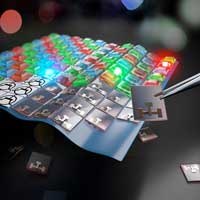| Aug 13, 2019 | |
Organic semiconductors - No encapsulation needed for unprecedented stability(Nanowerk News) Are organic semiconductors as good as silicon semiconductors? Apparently they are even better! Prof. Thomas Weitz and colleagues at the Max Planck Institute for Polymer Research and at BASF are able to produce highly efficient organic thin film transistors. |
|
 New transistors for OLED displays. (Image: C. Hohmann) The common opinion is that organic semiconductors are sensitive and unstable and hence cannot keep up with their inorganic counterparts. This impression has to change as the NIM scientist Professor Thomas Weitz and his colleagues at the Max Plank Institute for Polymer Research and at BASF demonstrate in their latest publication in Advanced Electronic Materials ("Solution-processed organic transistors with excellent electrical stability under ambient conditions"). Even in ambient air, this means in the presence of oxygen and water, at temperatures of 30°C and above, and after a 24-day-bias stress measurement their excellent properties are stable. “Our new thin film transistors from organic semiconductor material are characterized by very high electrical stability and charge carrier mobility,” explains Thomas Weitz. “This is an optimal basis for application in portable devices and displays where organic transistors could function as switching elements of OLEDs.” |
|
| In addition, their production is conceivably easy, as the organic transistors do not require encapsulation or complex processing steps. | |
Large scale printing |
|
| “Since we are using solution processes that are also used on an industrial scale, the hurdle for potential large-scale use of our transistors is comparatively low,” tells Weitz happily. | |
| Further advantages of organic circuits over inorganic materials are well known: low production costs, thinly printable applying common printing systems, and high mechanic flexibility. | |
Combination with OLEDs in flexible displays |
|
| Besides their resistance to bias stress and their high stability, there is another plus: The organic devices are stable to light. This makes them ideal for applications in advanced flat panel devices. Based on organic light-emitting diodes (OLEDs), flexible displays for various utilizations will be developed. |
| Source: Ludwig-Maximilians-Universität München | |
|
Subscribe to a free copy of one of our daily Nanowerk Newsletter Email Digests with a compilation of all of the day's news. |
